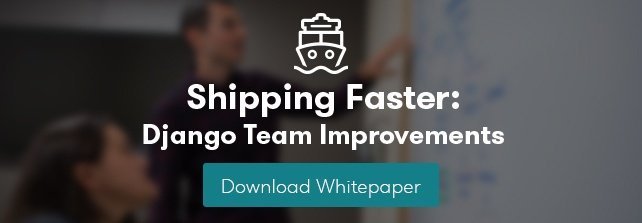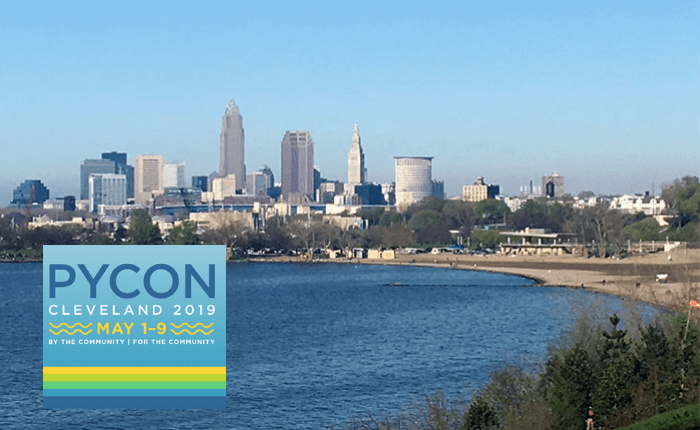
Pictured: I traveled to Cleveland, OH, for PyCon 2019, where I got this shot of the city skyline.
This year I attended PyCon for the first time. It’s rather amazing that I haven’t been before, since I’ve been using Python professionally for over 15 years. PyCon 2019 was held in Cleveland from May 1–9. There was so much to take in, and there are so many good things to say about it. It was a fantastic experience. But rather than provide a “mission report: 2019” a la Winter Soldier, I thought I’d do something more useful — write a guide to PyCon from a newbie perspective. Here are six lessons I learned from my first PyCon.
1. Register Early
PyCon regularly sells out, and the organizers have stated no desire to increase the size of the show (about 3,400 participants). We’re not yet to WWDC levels (Apple’s developer conference that sells out moments after registration opens), but it’s a good idea to register for PyCon as early as possible.
I learned this the hard way. By the time I was ready to register in mid-April, the conference was already sold out. Fortunately, Caktus Group, as a sponsor, had an extra conference pass available, so I was able to go after all. Note to self: Next year, register in February.
2. Open a Space
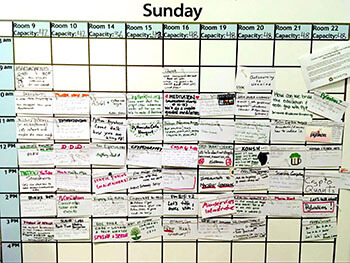 One of the most attractive aspects of PyCon is the open spaces. It’s very simple: There are several rooms available throughout the conference. The organizers put out boards with a schedule for each full conference day, and some cards and pens. Anyone (anyone!) can write a session topic on a card and post it on the board for a particular time and room. Then if anyone else is interested in your topic, they show up.
One of the most attractive aspects of PyCon is the open spaces. It’s very simple: There are several rooms available throughout the conference. The organizers put out boards with a schedule for each full conference day, and some cards and pens. Anyone (anyone!) can write a session topic on a card and post it on the board for a particular time and room. Then if anyone else is interested in your topic, they show up.
This simple setup is really inspiring. I’ve been to a lot of conferences over the years, and I’m always impressed that thousands of people will travel hundreds or even thousands of miles (and, at PyCon this year, from 59 countries) to sit in conference rooms and … passively listen to other people talk. I’ve often thought at such events, I could do this at home. Why don’t we have more open conversations? At PyCon, we can! This was one of my favorite aspects of the conference.
I attended several interesting open spaces, and there were several others that I wish I could have attended. Of note are:
-
Caktus’ own Scott Morningstar hosted a game called WINTERHORN. This live action game is a simulation in which you try to use a variety of bad techniques to disrupt people’s lives. If you win: Congratulations, you’ve done evil in the world! Then you go away and start seeing these techniques in use, and you’re wiser to the ways of the world. (You can read more about Scott and his passion for live action role play games.)
-
Vince Salvinno from CodeRed hosted an open space on Wagtail CMS. It was a great opportunity to talk about how different people are using the CMS. There were also several people present who were new to or just exploring Wagtail, so we were able to answer their questions and help them get enthused about this excellent CMS framework.
-
I went to the open space on Falcon Framework, a very fast lightweight API framework. Here, I was the new person exploring something for the first time. The team spent much of the session talking about the framework in general terms for newbies like me, as well as plans for the upcoming releases (async was a big topic). I was so impressed with both the team and the framework that I decided to join them during the sprints (more on that below).
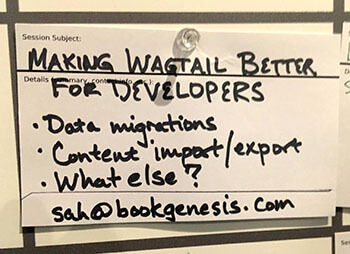
I also dove right in and hosted an open space myself — “Making Wagtail Better for Developers.” At Caktus we use Wagtail to provide our customers with a great content editing experience. We have another post on why Caktus loves Wagtail. It really is an excellent CMS, but there are a few aspects that could be made better, especially when it comes to data migrations, importing and exporting content, and editing content with nested StreamFields. I wanted to talk about a few of those issues with other developers and compare notes. Apparently, others wanted to talk about these things, too, because they showed up!
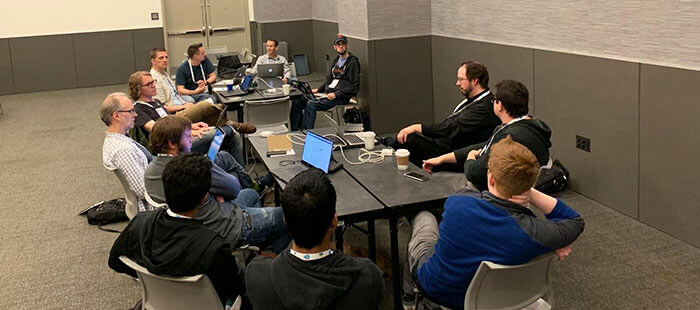 We made Wagtail better. (photo by Colin Copeland)
We made Wagtail better. (photo by Colin Copeland)
We had a good conversation about Wagtail and its development, and I was inspired to help make Wagtail better for developers by contributing to the project (I plan to talk about my work on data migrations in an upcoming blog post).
That is one of the best outcomes from a conference like this: You come away inspired to do better work.
3. Try Some Talks
When most people go to conferences, they focus on the talks, and while talks and keynotes are a great source of inspiration and learning, you can wear yourself out trying to go to them all. PyCon had a packed schedule of talks and keynotes (upcoming blog posts will go over some of them). Instead of maxing yourself out on all the talks, my recommendation is to pick only two or three talks to attend each day. Pick ones that will expand your knowledge and help you to think about how to grow in the coming year. Many of the scheduled speakers make their slides and recordings freely available after the conference, so if you can’t get to a talk during PyCon, you can continue the conference later in the comfort of your own home.
4. Nurture Your Network
It’s all about the community, they say, and seasoned conference goers know that conferences are one of the best opportunities to “make new friends, and keep the old.” Frankly, I put a higher priority on relationship-building activities than going to talks, and PyCon has a plethora of these activities to help you nurture your network:
-
Open Spaces: Good ones are engaging and relational. They aren’t just lectures.
-
Breakfast and Lunch: Every table is large, and you can join any conversation. Don’t miss the opportunity to talk with someone new. Like I did ... sleeping late and missing breakfast. At least I always got to lunch and met new people there.
-
Dinner:
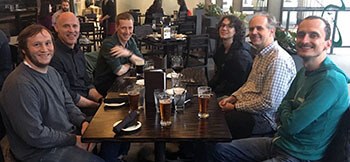 If you meet a new friend or an old one, you can have dinner together offsite. This is a greater time commitment than breakfast or lunch, and can lead to a much deeper relationship. This is especially important for those who work remotely, like me: Having a meal or drink together is just about the only thing we can’t do on Slack. Over a meal, you can get to know people so much better, and the good vibes carry over into a better working relationship. Pictured: A group of us from Caktus had dinner one night with a couple of folks from the Truth Initiative, with whom we’ve recently been working.
If you meet a new friend or an old one, you can have dinner together offsite. This is a greater time commitment than breakfast or lunch, and can lead to a much deeper relationship. This is especially important for those who work remotely, like me: Having a meal or drink together is just about the only thing we can’t do on Slack. Over a meal, you can get to know people so much better, and the good vibes carry over into a better working relationship. Pictured: A group of us from Caktus had dinner one night with a couple of folks from the Truth Initiative, with whom we’ve recently been working. -
Vendors / Sponsors / Exhibitors:
 Many of the exhibitors are developers, and all of them have periods of boredom during three days of exhibiting. If you see someone at a booth who is not talking to anyone, they are probably bored out of their wits and would welcome an opportunity to talk to you. Just walk up and say, “Hi! Can you tell me about [whatever it is that they are exhibiting ]?” It can lead to some of the best conversations you have. Also, free t-shirts. However, the Caktus sales team was not bored during the conference — whenever I went by, Tim Scales and Ian Huckabee (pictured) were always busy talking with someone.
Many of the exhibitors are developers, and all of them have periods of boredom during three days of exhibiting. If you see someone at a booth who is not talking to anyone, they are probably bored out of their wits and would welcome an opportunity to talk to you. Just walk up and say, “Hi! Can you tell me about [whatever it is that they are exhibiting ]?” It can lead to some of the best conversations you have. Also, free t-shirts. However, the Caktus sales team was not bored during the conference — whenever I went by, Tim Scales and Ian Huckabee (pictured) were always busy talking with someone. -
Job Fair: The job fair, which is open to the public, is another great opportunity to talk with company representatives. You’re less likely to find someone bored, but you’ll be able to pack a lot of conversations into a couple of hours. Even if you’re not looking for a new job, it’s interesting to see what opportunities are available, and see if there is a new skill set you want to work on. You might even find the perfect opportunity. Last year, I met Caktus at the PyCon job fair (I went to the fair but not the conference itself). This year, I talked with a lot of other companies and learned more about the lay of the land. My take: There’s good work available for Python engineers who understand DevOps, can build APIs, can support data scientists, and work well in a dynamic, collaborative environment. In fact, that sounds to me a lot like working with Caktus Group. They’re hiring, by the way.
-
Sprints: Not only are you contributing to a project, but you are working alongside some really smart people whom you might have just met. (More on the sprints below.)
5. Eat Early
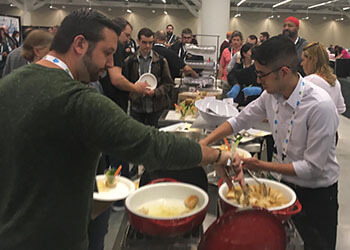 Speaking of meals, it’s imperative to arrive early to the meal line, because developers are a hungry lot, and there isn’t really extra. I learned this the hard way. One day, I was so busy sprinting and trying to get my tests working that I didn’t go to lunch until 45 minutes after the opening bell. At that point, all that was left was a large plate of potatoes. At least they were really good potatoes. Pictured: I was on time that day.
Speaking of meals, it’s imperative to arrive early to the meal line, because developers are a hungry lot, and there isn’t really extra. I learned this the hard way. One day, I was so busy sprinting and trying to get my tests working that I didn’t go to lunch until 45 minutes after the opening bell. At that point, all that was left was a large plate of potatoes. At least they were really good potatoes. Pictured: I was on time that day.
6. Sprint!
After the conference itself there are four days of sprints. These are like open spaces, but for coding. Anyone can host a sprint for their open-source project. You get a table in one of the open spaces rooms, and you code together for any length of time, up to four days. The conference organizers provide the space (with power and internet) and lunch (be quick or eat potatoes), and you provide the code. It’s a pretty sweet opportunity to get your feet wet with some new projects, or to work with your project team in person (a great opportunity when you all live in different places). It’s a great time to be with others, and despite the fact that a lot of joking and talking takes place around the table, a lot of serious coding also happens.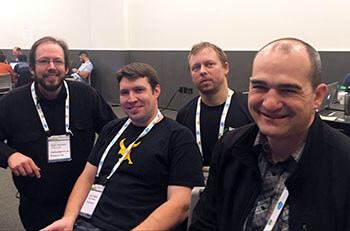
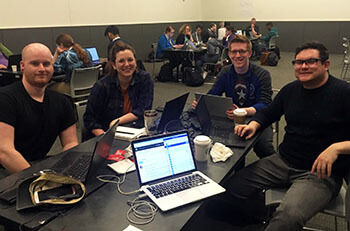 For my part, even though my work and family schedule didn’t allow me to stay for the entire sprint, I decided to stay through Monday (the first sprint day) and check out a couple of projects. Based on my interactions during the conference, I chose to sprint with Falcon Framework (top photo at right) for a few hours, and then switched to CodeRed CMS (bottom photo at right) for a couple of hours. I was a complete newbie on both projects, but both teams were super helpful in getting me onboard, and I was even able to commit some code to each project (see here and here) before driving home Monday evening. Sprinting with these teams was a wonderful experience for me.
For my part, even though my work and family schedule didn’t allow me to stay for the entire sprint, I decided to stay through Monday (the first sprint day) and check out a couple of projects. Based on my interactions during the conference, I chose to sprint with Falcon Framework (top photo at right) for a few hours, and then switched to CodeRed CMS (bottom photo at right) for a couple of hours. I was a complete newbie on both projects, but both teams were super helpful in getting me onboard, and I was even able to commit some code to each project (see here and here) before driving home Monday evening. Sprinting with these teams was a wonderful experience for me.
Prepare for Pittsburgh
Cleveland was pretty cool. I’m already looking forward to being in Pittsburgh for PyCon 2020. I hope to see you there. Just be sure to register on time — details about the next PyCon should be released mid-summer; you can watch @PyCon on Twitter for updates.
Unless noted, all images copyright © 2019 by Sean Harrison. All rights reserved.


